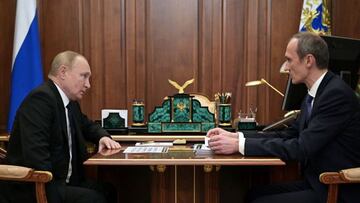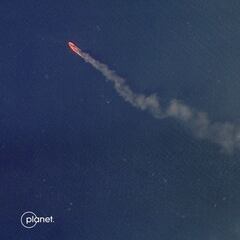Putin's six demands to end Russia's invasion of Ukraine
President Vladimir Putin has gone further than almost everyone expected with his brutal and inhumane, unlawful attack. So what does he want from it?


As the war between Ukraine and Russia rages on, representative from the two countries continue to meet almost daily in an attempt to reach an agreement and lay down their arms for good.
As of Monday, the official number of civilians killed in the war in Ukraine stands at 636, of whom 46 are children, according to the United Nations. A further 1,125 people have been injured, 62 of them being children. It is feared these figures fall well short of the reality.
Related articles:
- Which countries have no army or military force?
- Crypto control
- An attack on Poland or any other NATO member would activate Article 5
- Why the different spelling of the president's name reflect the changing view of Ukraine
What is the Kremlin asking for to end the war?
Although neither country is giving up at the moment, both countries want to end the war. According to Mykhailo Podoliak, negotiator and advisor to Ukrainian President Volodymyr Zelenskyy (learn more about his name), both Kyiv and Moscow have seen "significant progress" in the negotiations: "My personal expectation is that this progress will very soon lead to a common position between the two delegations and the signing of documents."
So what has Russian President Vladimir Putin been pushing for?
Putin's six key demands:
- No NATO membership and a neutral position.
- Russian should be the second official language of Ukraine, with laws prohibiting it abolished.
- Recognise Crimea as Russian territory.
- Recognise the independence of Donetsk and Lugansk.
- Demilitarisation of Ukraine and abandonment of weapons that could be a threat to the Kremlin.
- Banning of ultra-nationalist parties and organisations in Ukraine.
Following Monday's meeting, both countries acknowledged further "progress" in the negotiations, but did not give full details of the outcome, according to Podoliak, the two sides decided to take a "technical break" to facilitate "further work" in other sub-groups.
The Kremlin on Tuesday cautioned the West that Russia's interests as part of the Iranian nuclear deal would have to be ensured after the United States and its allies slapped sanctions on Moscow for the invasion of Ukraine. European powers have warned that Russia's demands to have its trade guaranteed with Iran could wreck an attempt to restore the Iranian nuclear deal which lifted sanctions on Tehran in return for curbs on its nuclear programme.
"The sanctions against Russia directly affect the interests of our country in the context of that deal," Kremlin spokesman Dmitry Peskov told reporters.
"So the sanctions must be taken into account," Peskov said. "This is a new aspect that cannot be ignored, that must be taken into account."
Putin says the "special military operation" in Ukraine is essential to ensure Russian security after NATO admitted members up to Russia's borders and Western countries supported pro-Western leaders in Kyiv. Ukraine says it is fighting for its existence. The United States and its European and Asian allies have condemned the Russian invasion. China has called for calm.
Telephone conversation with Prime Minister of Israel Naftali Bennett: situation around Ukraine, negotiation process https://t.co/EXaSBfIq0M
— President of Russia (@KremlinRussia_E) March 14, 2022
Iran said on Monday that the United States needed to make a decision to wrap up a deal to salvage Iran's 2015 nuclear accord with world powers.
On Tuesday, Iranian Foreign Minister Hossein Amirabdollahian met Russian Foreign Minister Sergei Lavrov in Moscow. Lavrov said the future of Iranian-Russian relations was bright as talks on reviving the nuclear accord were in the final straight.
"I am convinced that perspectives are even more impressive considering that the agreement on reviving the Joint Comprehensive Plan of Action is on the home straight," Lavrov said.
The Kremlin's Peskov said the United States knew Russia's position and that "there was a topic for the continuation of talks - it is really something that is very important for us."
Russia's invasion of Ukraine: a historical reflection
The Russia-Ukraine conflict is a complex affair and a result of a series of historical moments, broken promises, mistrust and suspicion on both sides - west and east. From 1922 until relatively recently, Ukraine was a satellite state of the federal Soviet Union, governed by the Communist Party of the Soviet Union (CPSU). That changed with the dissolution of the Soviet Union under Mikhail Gorbachev in the late 1980s.
Between 16 November 1988 and 26 December 1991, the USSR ceased to become a sovereign state and a Commonwealth of Independent States (CIS) was formed. Russia became self-governing while Ukraine gained independence in August 1991 and Belarus a few months later. A couple of years earlier, the political landscape had also changed in central Europe with the reunification of Germany which signalled the end of the Cold War.
NATO expansion
The origins of the present conflict and Russian invasion of Ukraine can be traced by the expansion of NATO, the military alliance which was formed in 1949 under the North Atlantic Treaty, an initiative designed to “safeguard the freedom, common heritage and civilization of the peoples” following the widespread destruction during World War II.
However, after the dissolution of the Soviet Union and German reunification, NATO’s purpose had to be reviewed. At a meeting in Moscow on 9 February 1990, US Secretary of State James Baker assured Gorbachev that NATO’s forces “would not expand an inch eastwards” or act as a threat to Russia or the newly-independent, former Soviet states.
Moving east
A transcript of that conversation is available in declassified documents, Baker told Gorbachev, “NATO is the mechanism for securing the US presence in Europe. If NATO is liquidated, there will be no such mechanism in Europe. We understand that not only for the Soviet Union but for other European countries as well it is important to have guarantees that if the United States keeps its presence in Germany within the framework of NATO, not an inch of NATO’s present military jurisdiction will spread in an eastern direction”.
Statement by the North Atlantic Council on Russia's attack on Ukraine#NATO | #Ukraine 🇺🇦 | #StopRussianAggression
— NATO (@NATO) February 24, 2022
However, just nine years after that meeting, Poland, the Czech Republic and Hungary - three former members of the Warsaw Pact, were accepted as members of NATO. As far as Moscow was concerned, NATO and the US had broken their promise.
Russia's relationship with NATO
NATO has an open-door policy, which means non-member states are free to join if they meet the alliance’s criteria and their submission is approved by the rest of the existing member states. Russia and NATO have cooperated on several issues such as the fight against terrorism but the Kremlin has always resisted the chance to join and relationships between the two deteriorated after the annexation of Crimea in 2014.
Ukraine invited to join NATO in 2008
Ukraine meanwhile, along with Georgia, Bosnia and Herzegovina are actively seeking to become signed-up members of NATO and that is what has irked Putin and the Kremlin, who feel that their own national security would be compromised. Ukraine was invited to join NATO at the Bucharest summit in April 2008.
A statement read: “NATO welcomes Ukraine’s and Georgia’s Euro-Atlantic aspirations for membership in NATO. We agreed today that these countries will become members of NATO. Both nations have made valuable contributions to Alliance operations. We welcome the democratic reforms in Ukraine and Georgia and look forward to free and fair parliamentary elections in Georgia in May. MAP is the next step for Ukraine and Georgia on their direct way to membership. Today we make clear that we support these countries’ applications for MAP. Therefore we will now begin a period of intensive engagement with both at a high political level to address the questions still outstanding pertaining to their MAP applications. We have asked Foreign Ministers to make a first assessment of progress at their December 2008 meeting. Foreign Ministers have the authority to decide on the MAP applications of Ukraine and Georgia”.
Related stories
After decades of mistrust, President Putin evidently doesn’t want NATO on his doorstep. Before ordering Thursday’s invasion, this is what he had to say in a televised address to the nation. “Ukraine never had a tradition of genuine statehood. Modern Ukraine was entirely created by Russia, more precisely, Bolshevik, communist Russia. This process began immediately after the revolution of 1917. If Ukraine was to join NATO it would serve as a direct threat to the security of Russia. They try to convince us over and over again that NATO is a peace-loving and purely defensive alliance, saying that there are no threats to Russia. Again they propose that we take them at their word. But we know the real value of such words”.
Some commentators have suggested that Putin launched the military assault with the aim of reclaiming Ukraine as part of a broader plan to reconstruct the old Soviet Union. Putin and his supporters have justified the Russian invasion, describing it not as an invasion with the intention of occupying Ukraine but as “a special military occupation” and to “demilitarize and neutralise” the threat from their neighbouring country.

